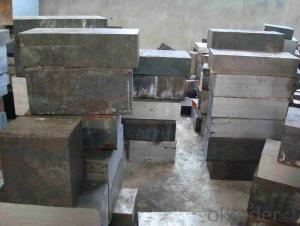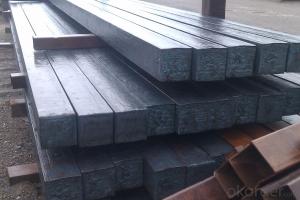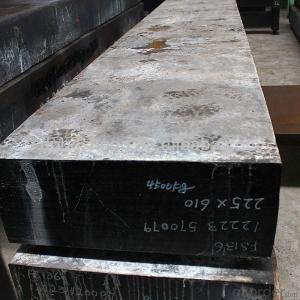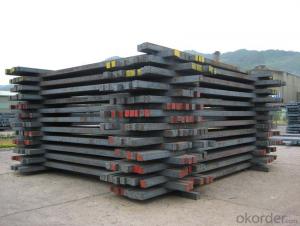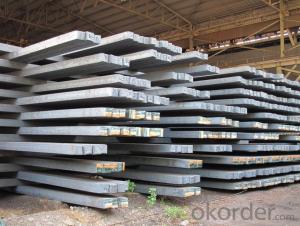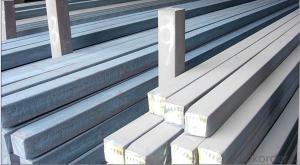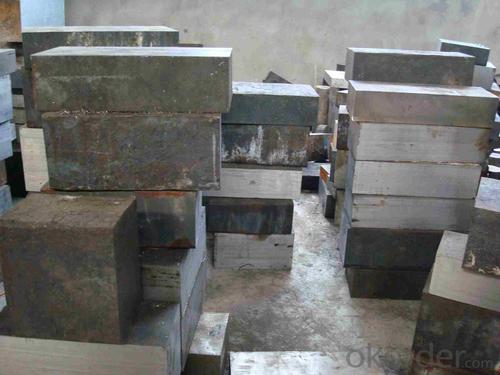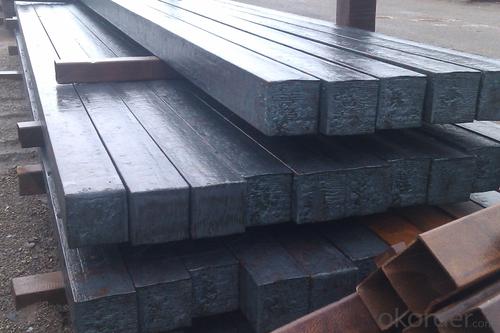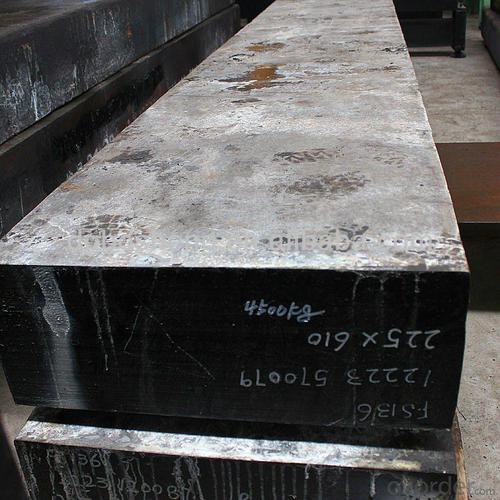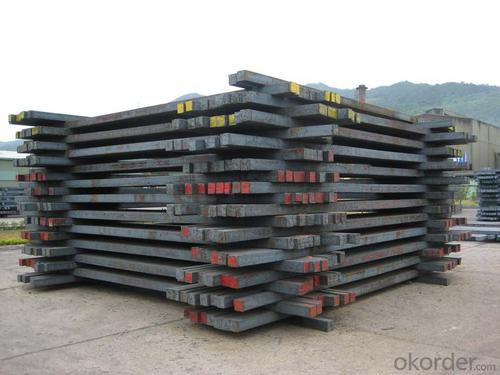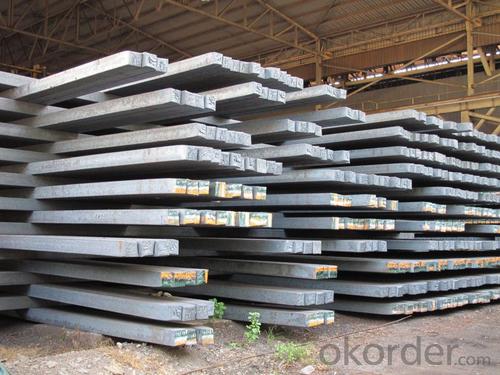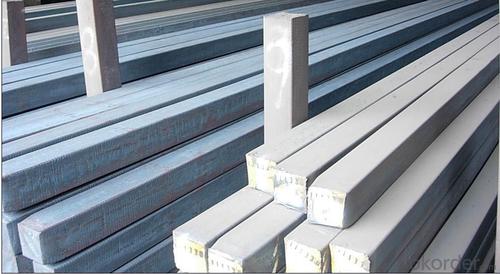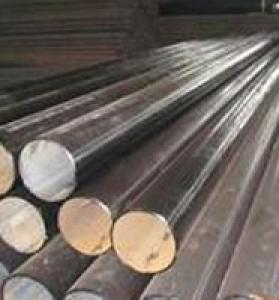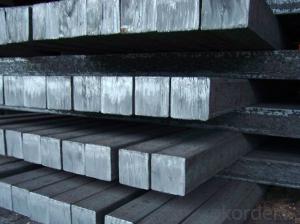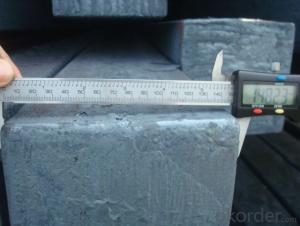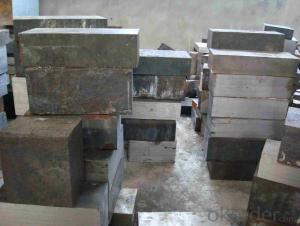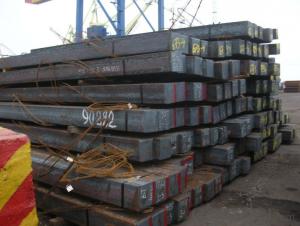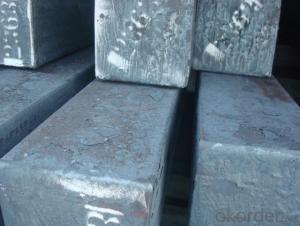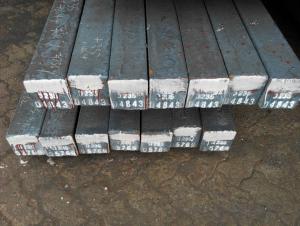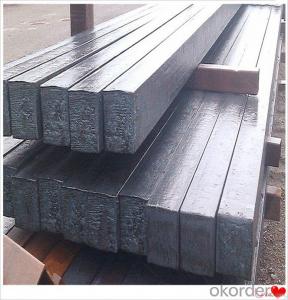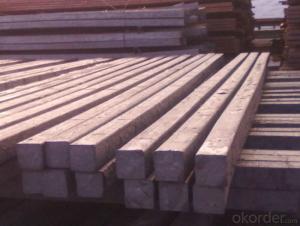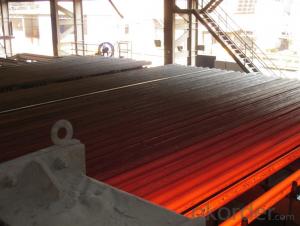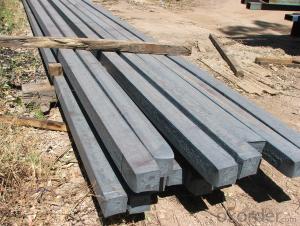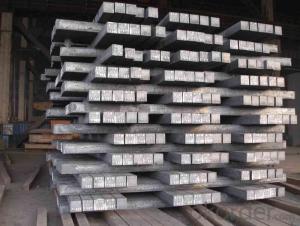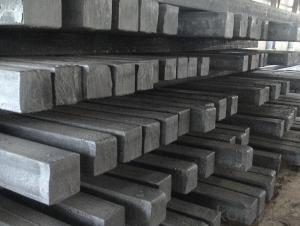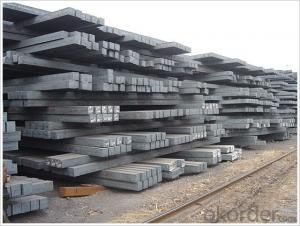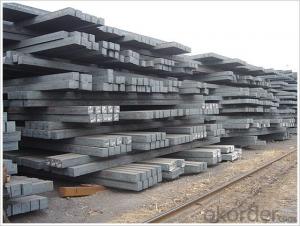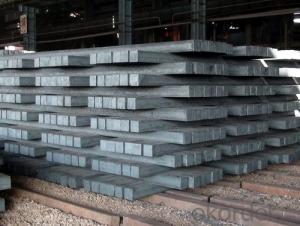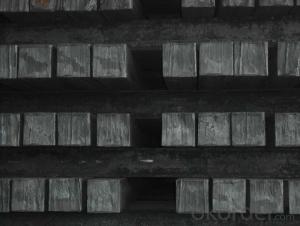Q235/3SP 100MM Blast Furnace Hot Rolled Steel Billet
- Loading Port:
- Tianjin
- Payment Terms:
- TT OR LC
- Min Order Qty:
- 2000 m.t.
- Supply Capability:
- 30000 m.t./month
OKorder Service Pledge
OKorder Financial Service
You Might Also Like
Description of Q235/3SP 100MM Blast Furnace Hot Rolled Steel Billet
Our hot dip galvanised steels consist of a steel substrate with a metallic zinc coating applied by means of a continuous hot dip galvanising process. Metallic zinc coatings are available in steel grades ranging from steel for bending and deep drawing applications, to structural steels and high yield strength steels.
A glossy surface finish obtained under specific skin-pass conditions (either non-skin-passed or skin- passed with smooth cylinders to obtain low roughness) can be provided if required at time of enquiry.
Advantage of Q235/3SP 100MM Blast Furnace Hot Rolled Steel Billet
Uncoated CR steel sheet With the features of in line with the international highest standards in demension and shape, excellent surface finish and properties, the products are mainly used in home appliance and automobile industries.
Galvanized steel sheet(include HDG and EG)
With the features of good corrosion resistance, the products are mainly used in automobile, home appliance, electronics, building and machinery manufacture industries, etc.
Precoated steel sheet With the features of enviromental protection and good processablility, long lasting surface durability, rich in colors, the products are maily used in building, home appliance and furniture industries, etc.
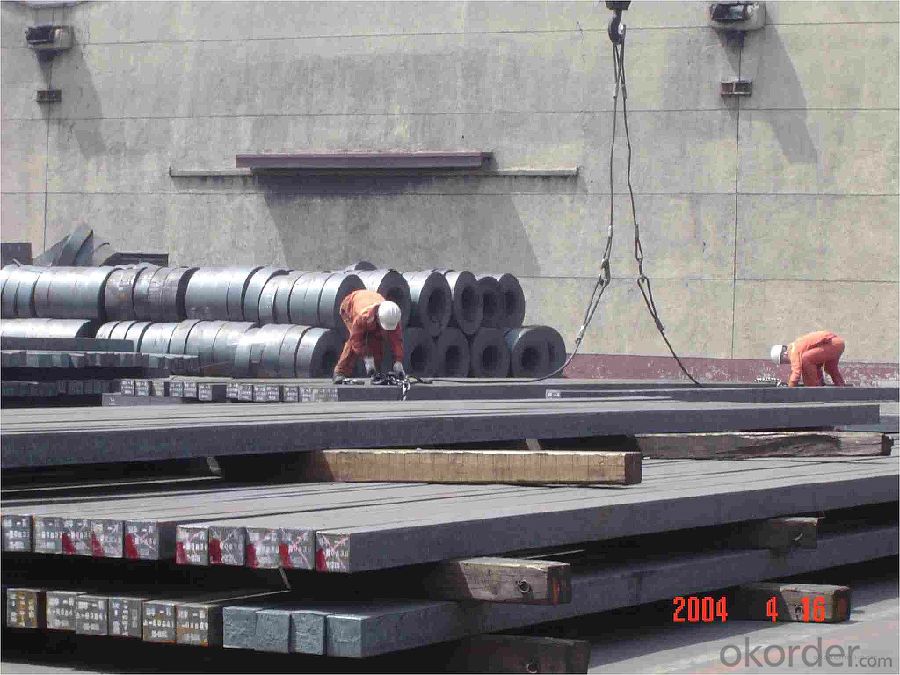
Applications of Q235/3SP 100MM Blast Furnace Hot Rolled Steel Billet
Our hot dip galvanised steels can be used in a very wide range of applications for industrial markets, both indoors and outdoors. Some of the most common applications are:
Building: wide sections for roofing and cladding, doors, door frames, metallic ceilings, partitions, structural members etc
Domestic appliances: all appliances for this sector (both white and brown goods) are manufactured with hot dip galvanised steels
Miscellaneous: electrical cabinets, aeraulic components, air conditioners, road signs etc
Zinc hot dip galvanised steel is suitable for contact with foodstuffs under certain conditions, as specified in European directive 89/109/EEC and French standard NF A 36-712-1. Please contact us for further information on this subject.
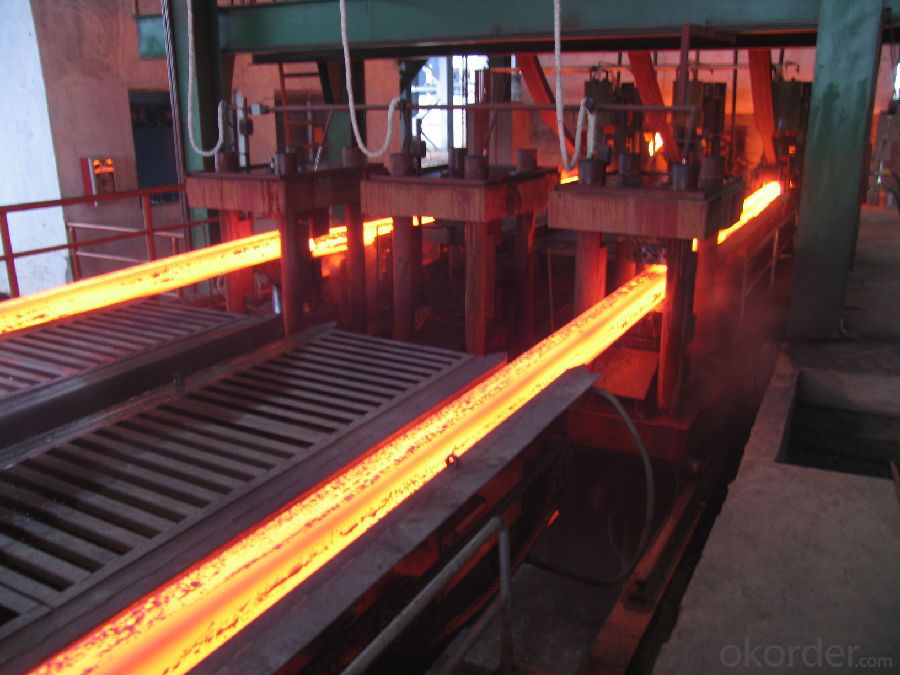
Specifications of Q235/3SP 100MM Blast Furnace Hot Rolled Steel Billet
Quality | Q/BQB 440-2003 | JIS G3312-1994 JIS G3321 | EN 10326-2004 | ASTM A653-02a |
EN 10327-2004 | (BASE PLATE) | |||
(BASE PLATE) | ||||
Commercial Steel | DC51D | SGCC SGLCC | DX51D+Z DX51D+AZ | CS Type A/B/C |
Forming Steel | St01,St02,St03 | SGCD1 SGLCD1 | FS Type A, Type B | |
Drawing | DC52D /DC53D | - | DX52D+Z DX52D+AZ | DDS TYPE A/C |
Steel | DX53D+Z DX53D+AZ | |||
Structural | S280GD (StE28) | SGC400 SGLC400 | S280D+Z DX54D+AZ | SS275 |
Steel | S350GD (StE34) | SGC440 SGLC440 | S350D+Z S350D+AZ | SS340 Class1 |
FAQ of Q235/3SP 100MM Blast Furnace Hot Rolled Steel Billet
We have organized several common questions for our clients,may help you sincerely:
1. How Can I Visit There?
Our company is located in Tianjin City, China, near Beijing. You can fly to Tianjin Airport Directly. All our clients, from home or aboard, are warmly welcome to visit us!
2. How Can I Get Some Sample?
We are honored to offer you sample.
3. Why choose CNBM?
Our delivery time about 15-20days for standard sizes, if you have other requirements like hardness, quanity and width ,it is about 20-40days. But don't worry we also try our best for the delivery time ,because time longer and our cost is higher.
- Q: How are steel billets used in the manufacturing of heavy machinery?
- Steel billets are a crucial component in the manufacturing of heavy machinery. These billets are essentially semi-finished steel products that are hot-rolled or forged into a specific shape, usually a square or rectangle. The first step in using steel billets for heavy machinery is to heat them to a high temperature, making them malleable and easier to work with. Once heated, the billets are then shaped and formed through various processes such as extrusion, rolling, or forging. This allows manufacturers to create the desired components and parts needed for heavy machinery, such as gears, shafts, frames, and structural components. The use of steel billets in heavy machinery manufacturing is essential due to the inherent properties of steel. Steel is known for its high tensile strength, durability, and resistance to wear and tear. These properties make it an ideal material for heavy machinery that is subjected to intense forces, vibrations, and harsh operating conditions. Moreover, steel billets offer versatility in terms of customization and design. Manufacturers can modify the shape, size, and composition of the billets to meet the specific requirements of the heavy machinery being produced. This flexibility allows for the creation of complex and intricate components that can withstand the demands of heavy-duty applications. Once the steel billets are shaped into the desired components, they undergo further processes such as heat treatment, machining, and finishing to enhance their mechanical properties and precision. These steps ensure that the final products meet the required specifications and standards for heavy machinery manufacturing. In summary, steel billets play a crucial role in the manufacturing of heavy machinery. Their malleability, strength, and customization options make them an ideal material for creating durable and reliable components that can withstand the demands of heavy-duty applications.
- Q: How are steel billets used in the manufacturing of pressure vessels?
- Pressure vessels require steel billets as a necessary part of their manufacturing process. These metal products are in a semi-finished state and are typically made through casting or extrusion. The billets are molded into a solid square or rectangular shape to ensure consistent and uniform material for further processing. To initiate the manufacturing process, the steel billets are heated to a specific temperature, making them more malleable and easier to handle. Once heated, they are placed into a forging machine, where intense pressure and shaping take place. This forging process effectively eliminates any defects or inconsistencies in the billet's structure, resulting in a stronger and more durable material. After the forging stage, the steel billets undergo additional processing using different techniques like rolling or machining. These techniques are employed to achieve the desired dimensions and shape required for pressure vessel fabrication. By refining the billet's surface finish and improving its mechanical properties, these techniques enhance the overall quality of the billet. Once the billets have been shaped and processed, they are cut into smaller sections that serve as the foundation for constructing pressure vessels. These sections are welded together to form the vessel's shell, ensuring a secure and tight seal to contain high-pressure fluids or gases. The use of steel billets in pressure vessel manufacturing is critical due to their superior strength, durability, and resistance to high-pressure environments. The uniformity and consistency of the billets provide a reliable material for fabricating vessels that can endure extreme conditions, guaranteeing the safety and integrity of the contents within. In conclusion, steel billets play a crucial role in the manufacturing of pressure vessels by providing the core components for constructing the vessel's shell. Through a series of heating, forging, and processing techniques, the billets are transformed into robust and enduring sections that are then welded together to form the final vessel. The utilization of steel billets ensures the structural integrity and dependability of pressure vessels, making them suitable for a wide range of industrial applications.
- Q: What are the common defects found in steel billets?
- Some common defects found in steel billets include surface cracks, internal voids or inclusions, improper segregation of alloying elements, and uneven grain structure. Other defects may include surface pitting, surface decarburization, or dimensional inconsistencies. These defects can affect the quality and strength of the steel billet, and may require further processing or corrective measures before the billet can be used for manufacturing purposes.
- Q: How do steel billets contribute to the manufacturing of textile machinery?
- Steel billets play a crucial role in the manufacturing of textile machinery as they are used as raw materials for creating various components and parts. These billets are transformed into different shapes and sizes through processes like casting, forging, and machining to form the necessary components of textile machinery such as gears, shafts, frames, and bearings. The high strength and durability of steel billets ensure that the textile machinery is capable of withstanding heavy loads, high speeds, and continuous operation, resulting in efficient and reliable performance in the textile industry.
- Q: What are the challenges in welding steel billets?
- Welding steel billets presents various obstacles that need to be addressed. One of the primary hurdles involves achieving proper heat distribution throughout the welding process. Given their considerable size and thickness, steel billets make it difficult to evenly distribute heat across the material. Consequently, this can lead to inconsistencies in the weld, resulting in weak areas or even joint failure. Another challenge revolves around the possibility of distortion and warping during the welding process. The application of heat to the steel causes the material to expand and contract, leading to undesired changes in shape and dimensions. This issue becomes particularly problematic when dealing with larger or more intricate structures, as maintaining the desired shape and dimensions becomes crucial. Furthermore, steel billets may contain impurities and contaminants that can impact the weld's quality. These impurities, such as sulfur, phosphorus, and other elements, can trigger the formation of brittle zones or other defects in the weld. To mitigate these challenges, it is necessary to adequately clean and prepare the billet surface, as well as employ appropriate welding techniques and filler materials. Moreover, the high carbon content commonly found in steel billets makes them susceptible to cracking during the welding process. Carbon acts as a hardening agent in steel and can increase its vulnerability to cracking, particularly if proper preheating and post-weld heat treatment procedures are not followed. Essential measures include controlling the cooling rate and implementing stress-relieving techniques to prevent cracking and ensure weld integrity. Lastly, the sheer size and weight of steel billets can pose logistical challenges during welding. The handling and positioning of these heavy objects necessitate specialized equipment and skilled operators to guarantee safety and accuracy. Additionally, achieving precise alignment and fit-up becomes more complex with larger billets, demanding careful planning and execution. To summarize, welding steel billets involves overcoming challenges such as heat distribution, distortion and warping, impurities and contaminants, carbon-induced cracking, and logistical issues. Successfully navigating these obstacles requires expertise, appropriate equipment, and adherence to proper welding techniques and procedures.
- Q: What are the common surface treatments for steel billets?
- Common surface treatments for steel billets include hot-dip galvanizing, electroplating, painting, and powder coating.
- Q: How do steel billets contribute to the manufacturing of aerospace components?
- Steel billets play a crucial role in the manufacturing of aerospace components. These billets are semi-finished products that are used as a starting material in the fabrication of various aerospace parts. One of the primary ways steel billets contribute to the manufacturing of aerospace components is through their versatility. Steel is known for its exceptional strength, durability, and resistance to corrosion, making it an ideal material for aerospace applications. Billets made from high-quality steel provide the necessary foundation for the production of components that can withstand the extreme conditions experienced during aerospace operations. Steel billets are often used in the production of critical aerospace parts such as engine components, landing gear, structural frames, and fasteners. The billets are first heated and then subjected to various forming and machining processes. These processes, such as forging, rolling, and extrusion, help shape the steel billets into the desired components, ensuring they meet the stringent requirements for strength, precision, and weight reduction demanded by the aerospace industry. Moreover, steel billets offer excellent design flexibility. They can be easily machined and shaped into complex geometries, allowing manufacturers to create intricate aerospace components with precise tolerances. This flexibility enables the production of lightweight yet strong parts, contributing to the overall weight reduction of aircraft and enhancing fuel efficiency. Furthermore, steel billets offer superior metallurgical properties. Through proper heat treatment and alloying techniques, the mechanical properties of the steel can be tailored to meet specific aerospace requirements. This allows manufacturers to achieve the desired balance between strength, stiffness, and toughness in the final components, ensuring they can withstand the high-stress environments encountered in aerospace applications. In conclusion, steel billets are an indispensable part of the manufacturing process for aerospace components. Their versatility, strength, design flexibility, and metallurgical properties make them an ideal starting material for the production of critical parts in the aerospace industry. By utilizing steel billets, manufacturers can ensure the production of high-quality, reliable, and durable components that meet the rigorous demands of the aerospace sector.
- Q: Are steel billets used in the manufacturing of industrial machinery?
- Yes, steel billets are commonly used in the manufacturing of industrial machinery. They serve as a primary raw material for various components and parts, providing strength, durability, and versatility required in heavy-duty applications.
- Q: What is the typical composition of a steel billet?
- The specific grade and intended use of a steel billet can cause its typical composition to vary. Nevertheless, in general, a steel billet primarily consists of iron, carbon, and additional alloying elements. Steel's main constituent is iron, which typically accounts for about 98% of its composition. This element provides the material with structural strength and durability. Carbon, the second most significant element, usually ranges from 0.02% to 2.1% and plays a vital role in determining the steel's hardness and strength. Besides iron and carbon, steel billets often incorporate various alloying elements to enhance specific properties. These elements may include manganese, silicon, nickel, chromium, molybdenum, vanadium, and others. Each element contributes to different characteristics, such as corrosion resistance, heat resistance, toughness, or machinability. Moreover, steel billets are frequently produced through processes like continuous casting or hot rolling, which can introduce small amounts of impurities. These impurities, such as sulfur, phosphorus, and oxygen, are typically maintained at very low levels to preserve the desired quality of the steel. In conclusion, the typical composition of a steel billet comprises a combination of iron, carbon, alloying elements, and minor impurities. These components are carefully regulated to achieve the desired mechanical properties and performance for a wide range of applications in industries such as construction, automotive, aerospace, and manufacturing.
- Q: What is the purpose of using steel billets in manufacturing?
- The aim of utilizing steel billets in the manufacturing sector is to produce a dependable and adaptable raw material for diverse industrial uses. These semi-finished goods, known as steel billets, are created through the continuous casting or hot rolling methods. These solid rectangular or square-shaped steel bars act as the foundation for manufacturing a wide array of steel products. One of the main objectives of using steel billets is to provide a reliable and high-quality material with specific mechanical properties. Steel, which is composed of iron and carbon, can be customized by adjusting the carbon content, alloying elements, and heat treatment processes. By controlling these variables during the production of steel billets, manufacturers can ensure that the resulting steel products possess desired characteristics such as strength, hardness, ductility, and resistance to corrosion. Moreover, steel billets enable manufacturers to efficiently shape and form the desired end products. They can undergo further processing using techniques like hot rolling, forging, extrusion, or machining to create different shapes, sizes, and profiles. Steel billets serve as the starting point for the production of a wide range of steel products, including bars, rods, tubes, wire, structural shapes, and even intricate components for machinery, automobiles, construction, and infrastructure projects. Additionally, the utilization of steel billets in the manufacturing sector offers numerous advantages. Steel is renowned for its outstanding strength, durability, and versatility, making it an ideal material for various applications. Steel billets provide a cost-effective option for manufacturers as they can be mass-produced and easily transformed into different forms. Furthermore, steel is highly recyclable, ensuring a sustainable and environmentally friendly manufacturing process. In conclusion, the purpose of incorporating steel billets in manufacturing is to provide a consistent and high-quality raw material that can be shaped and processed into a variety of steel products. Steel billets offer the flexibility, strength, and durability required for a wide range of industrial applications, making them an indispensable component in the manufacturing industry.
Send your message to us
Q235/3SP 100MM Blast Furnace Hot Rolled Steel Billet
- Loading Port:
- Tianjin
- Payment Terms:
- TT OR LC
- Min Order Qty:
- 2000 m.t.
- Supply Capability:
- 30000 m.t./month
OKorder Service Pledge
OKorder Financial Service
Similar products
Hot products
Hot Searches
Related keywords
